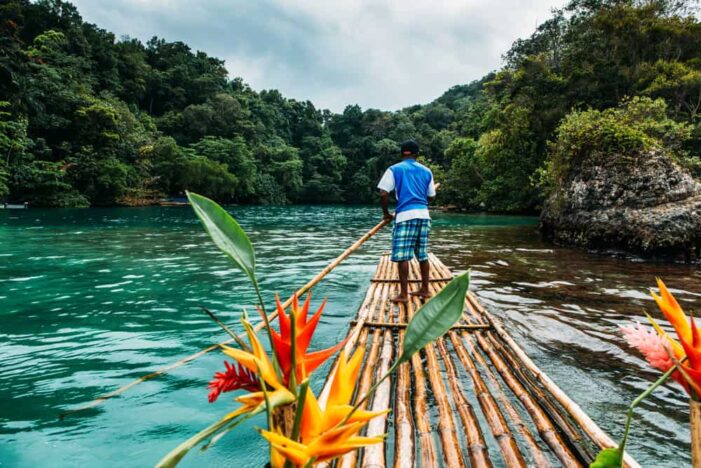By eTurboNews
Jamaica Minister of Tourism, Hon. Edmund Bartlett was a featured speaker and thought leader at the Eco-Canada’s Sustainable Blue Economy Summit 2024 in Halifax, Canada, highlighting the critical importance of the blue economy to building tourism resilience and sustainability, on Tuesday, March 19, 2024.
In his speech Minister Bartlett highlighted the critical issues facing the ocean economy around the world:
The World Bank defines the Blue Economy as “the sustainable use of ocean resources for economic growth, improved livelihoods and jobs, and ocean ecosystem health. This definition places a strong moral obligation on every sector, particularly those that heavily incorporate ocean and marine resources into their value chains to intensify their efforts to safeguard fragile and rapidly depleting ocean and marine ecosystems. These ecosystems have become increasingly vulnerable to degradation linked to human-related activities such as ocean pollution, shipping and transport, tourism and recreation, dredging, offshore drilling, deep-sea mining, and overfishing. These activities are contributing to global warming – a phenomenon that disproportionately affects ocean and marine ecosystems.
The United Nations estimated that the ocean has absorbed about 90 percent of the heat generated by rising emissions. As heat and energy levels in the ocean reach excessive levels, the resulting change in temperature has led to unprecedented and mounting consequences, including ice-melting, sea-level rise, marine heatwaves, and ocean acidification., These changes ultimately contribute to a lasting destabilizing effect on marine biodiversity, and the lives and livelihoods of coastal communities and beyond – including around 680 million people living in low-lying coastal areas, almost 2 billion who live in half of the world’s megacities that are coastal, nearly half of the world’s population (3.3 billion) that depends on fish for protein, and almost 60 million people who work in fisheries and the aquaculture sector worldwide.
Combined with the greater frequency of tropical cyclones, sea-level rise has exacerbated extreme events such as deadly storm surges and coastal hazards such as flooding, erosion, and landslides, which are now projected to occur at least once a year in many locations. Rising temperatures also increase the risk of irreversible loss of marine and coastal ecosystems. Today, widespread changes have been observed, including damage to coral reefs and mangroves that support ocean life, and migration of species to higher latitudes and altitudes where the water could be cooler.
Given the context outlined, ocean action now occupies an important place in the global agenda to promote the development of sustainable ocean economies. The transition to sustainable ocean economies requires binding consensus and principled commitment to urgent ocean action by all sectors and industries that directly exploit or impact marine and ocean ecosystems in collaboration with policymakers and government regulators. Of all segments of the global economy, tourism is arguably the industry that most critically exemplify the urgency of ocean action. The attraction of most tourist destinations is tied to healthy ocean and marine ecosystems thus the rapid intensification of marine and ocean degradation poses an existential threat to the sector, especially within the context of tourism-dependent economies such as those located in the Caribbean the Mediterranean Sea as well as the Pacific, Atlantic and Indian Oceans.
Admittedly, tourism-related activities impose significant stress on coastal and marine ecosystems. Thus, the sector must commensurately play a leading global role in adopting and encouraging more sustainable values, attitudes and practices that will promote healthy ocean and marine systems. The role of the tourism sector in promoting ocean health has already been officially recognized in the Sustainable Development Goals (SGDs) by way of SGD 14 which emphasizes sector’s role as a catalyst for the sustainable use of oceans and marine resources.
Firm commitment to the adoption of sustainable behaviors and practices backed by dedication action is necessary to help preserve the enormous benefits of health marine and coastal ecosystems to the economic livelihoods and survival of billions of people globally. Indeed, oceans cover 70% of the plane, provide us with oxygen and food, regulate the climate as well as provide habitats for 80% of life on Earth. Overall, healthy marine and coastal ecosystem serve as valuable sources of food, income, trade and shipping, minerals, energy, water supply, recreation and indeed tourism.
Recognizing the significance of healthy marine and coastal ecosystems in fostering sustainable tourism is particularly crucial. This recognition is underscored by the fact that 80 percent of tourism is concentrated in coastal towns and regions, with the ocean-related tourism sector witnessing an annual growth estimated at US$ 134 billion (UN Global Compact). The OECD has forecasted that marine and coastal tourism will emerge as the leading sector within the global ocean-based economy by 2030, yielding an estimated US$777 billion in global revenue and providing employment for 8.6 million individuals.
Small island states are particularly reliant on coastal and marine tourism. It constitutes the largest economic sector for most Small Island Developing States and many coastal states. In the Caribbean, for example, the industry accounts for a quarter of the total economy, and a fifth of all job. A 2016 study by the World Bank estimated the economic value of the Caribbean Sea coastal and marine ecosystems at US$54.55 billion. Indeed, the Caribbean Sea, which encircles the Caribbean region and is the second largest region of the Atlantic Ocean, is a valuable source of food, income, trade and shipping, minerals, energy, water supply, recreation and tourism for Caribbean economies. The coral reef-mangrove-seagrass complex also brings increased safety to coastal communities as the systems act as a natural barrier, decreasing the impact of floods and storms. The Caribbean Sea is considered the “high-diversity heart” of the Tropical West Atlantic and without coral reefs, it has been estimated that 25% of all marine life would die.
Unfortunately, marine, and coastal ecosystems are often threatened by tourism development. The areas that attract tourists have been coming under increasing pressure from the damage and pollution caused by tourist facilities and the supporting infrastructure. At the same time, the impacts of climate change, overfishing and other unsustainable practices, and even some marine tourism activities damage marine ecosystems such as coral reefs that are vital for maintaining ecological diversity and regulating climate. The United Nations has estimated the cost of reduced tourism due to coral bleaching at $12 billion annually. The industry can also have negative impacts on the environment and the communities it serves, especially areas where resources are limited. For example, the impacts associated with large cruises include the emission of greenhouse gases, which contribute to climate change and waste from ships, which causes pollution and reduces the resilience of marine ecosystems and damage to fragile coastal and marine environment including corals. Thus, the tourism sector can benefit from resilience by adopting sustainable practices that minimize its impact on the ocean and marine ecosystems and build the capacity of communities to adapt to change.
From a post-pandemic perspective, a sustainable blue economy offers an opportunity for countries to build back better from the COVID-19 pandemic by shifting away from business as usual and embracing the more sustainable development pathway .This is as the The Blue Economy approach emphasizes the assessment and incorporation of the real value of the natural (blue) capital into all aspects of economic activity including conceptualization, planning, design, infrastructure development, transport, recreation, trade, production and consumption patterns. Overall, the blue economy approach presents us with a unique opportunity to increase our response to the biggest challenges facing the ocean, including waste, the over-consumption of vital resources, pollution, biodiversity loss and unsustainable coastal development—all through the acceleration of climate action in ocean tourism.
I firmly believe that the shift to a blue economy—one that sees the sustainable use of ocean resources to benefit economies, livelihoods and ocean ecosystem health—must be driven by tourism. In this regard, I pause to acknowledge the establishment of the Blue Tourism Resource Portal which was created to help tourism decision makers, managers, and operators make their destinations sustainable and resilient by offering useful resources including but not limited to guidelines, toolkits, good practices and case studies. The Blue Tourism Portal builds upon the commitment of the 16-member OCEAN Panel’s 2030 goal of ensuring that “Coastal and ocean-based tourism is sustainable, resilient, addresses climate change, reduces pollution, supports ecosystem regeneration and biodiversity conservation and invests in local jobs and communities.’ The spirit of this vision was further reflected in the Ocean Panel-commissioned report entitled “Opportunities for Transforming Coastal and Marine Tourism: Towards Sustainability, Regeneration and Resilience” which harnessed the perspectives of over 40 experts to generate an exhaustive toolkit on sustainable coastal and marine tourism; generating a comprehensive understanding of marine and coastal tourism across the world and showcasing the global scale and impact of the opportunities and benefits that can be realized by transforming the coastal and marine tourism industry.
I also recognize my country’s own effort to tap into the potential of the blue economy through various investment, mitigation, and adaptation strategies. A scoping study commissioned by the Planning Institute of Jamaica concluded that the blue economy in 2020 contributed an estimated US$2.5 billion of gross value added for Jamaica with more 500,000 jobs attributed to the sector – the equivalent of 37 per cent of the employed labor force. Jamaica in developing a framework for all sectors that touch on the use of the sea under the Blue Economy Framework Project has also been utilizing funding valued at some US$400,000 from the PROBLUE trust through the World Bank to support growth in the area. The country has been pursuing various mitigation and adaptation strategies including: developing more opportunities for recycling, strengthening regulations and legislations on waste management and environmental protection , introduction of single use plastic ban ,strengthening the institutional capacity of agencies connected to the sector in order to have better coordination and more sustainable exploitation of the EEZ, improving financing policies for enterprises , supporting increased research on coastal protection and marine biology and raising awareness of the adverse consequences of the current business-as-usual action on ocean resources.
In conclusion, it is evident that the partnership between the tourism sector and other industries is crucial in promoting ocean health and fostering a blue economy. By embracing sustainable practices, collaborating with local communities, and advocating for policy changes, we can harness the immense potential of our oceans while safeguarding their delicate ecosystems. Together, we can create a future where tourism not only benefits local economies and enriches travelers’ experiences but also contributes to the preservation of marine biodiversity and the well-being of coastal communities worldwide. Let us continue to work hand in hand towards a sustainable and thriving blue economy for generations to come.




